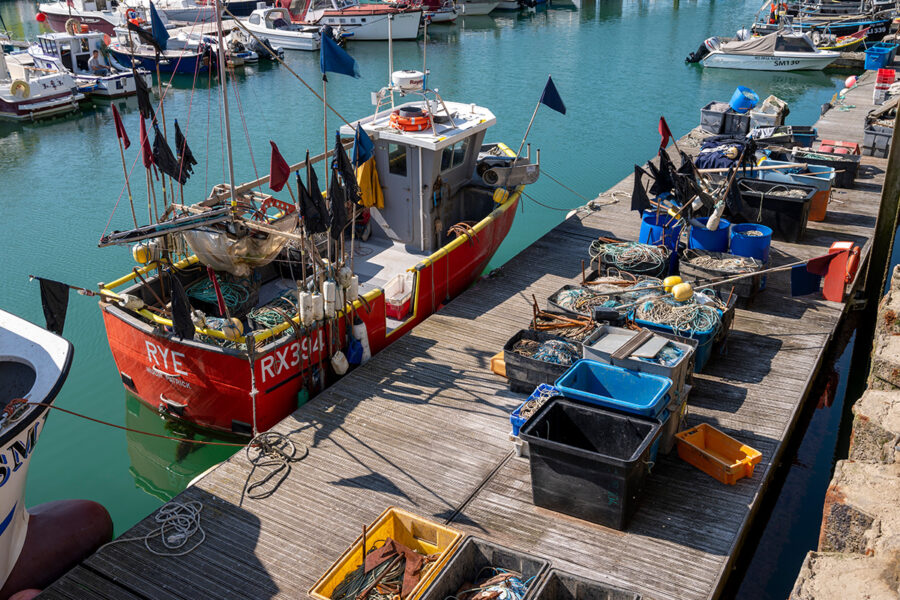With fuel prices continuing to hover around the £1/litre mark, the industry is continuing to press Defra for some kind of financial support as vessels struggle to stay viable, reports Tim Oliver.
High fish prices are helping the bottom line, but there is no guarantee they will continue, and there seems little prospect of any significant fall in fuel prices any time soon.
Fuel costs are eating into earnings to such an extent that many vessels have little left to pay their crews, and there are fears that if low wages continue, crews will walk away.
Under-15m boats continue to face often significant costs and lengthy tie-ups in order to comply with the new MCA safety code, adding to their financial difficulties.
But so far, Defra has given no indication that it is willing to help the industry.
Juliette Hatchman, chief executive of the South Western FPO, said that fuel prices are ‘pretty shocking’.

Juliette Hatchman: “Everyone is feeling the pain.”
With scallopers and beam and otter trawlers in its membership, which extends along the south coast, and into Wales and North East Scotland, the PO has a good overall picture of prices throughout the country. Juliette Hatchman said she monitors the prices ‘really closely’, and with others in the industry meets Defra once every two weeks to review the situation and press for support – but so far without success.
“Everyone is feeling the pain, and I’m engaging with Defra every other week to try to set out the concerns and the real impact of the continuing high fuel prices,” she told Fishing News.
“Prices keep rising, and crews are getting paid significantly less than they deserve. Crewing is always a worry, and now we’re concerned they are going to start walking – it’s pretty dire.
“A scalloper member contacted me yesterday after a four-and-a-half-day trip, and the cost of his fuel was so high the crew got only £94 each. They are not going to hang around for long on that kind of money.
“When I first joined the PO and started talking to members, crewing was right at the top of their list of issues, so as a PO we are looking at ways we can encourage new recruits and retrain current crews. This couldn’t have come at a worse time.”
She said the SWFPO had put some support options to Defra, but ‘we’re not getting very far at the moment’. “We’re beginning to think we may have to start lobbying the Treasury as well.”
The fuel crisis has also put a stop to ‘green’ initiatives that the PO was planning to reduce the impact of fishing on the marine environment and cut fuel costs, because there is no money or appetite for such projects now.
“The industry is very keen to try different approaches to things, but there is no spare cash. Basically, this is restricting skippers’ ability to innovate,” said Juliette Hatchman.
“I wanted to run a fuel-saving trial to look at ways where we could reduce our fuel consumption, initially from a climate change perspective, but obviously to help with fishing economics as well.
“There’s a big drive to do that now – but you need money.”
The SWFPO has asked Defra for help with money from the Fisheries and Seafood Scheme, but this needs 50% or 75% funding from the industry, which currently isn’t possible.
“We’re asking Defra to use some of that fund in the form of a support package for the industry, but Minister Prentis is currently saying: ‘No, we’re not intending to do that’ – so we’ve been thinking of alternative ways the industry could be supported like it was with Covid. They weren’t perfect support packages, but something along the same lines.”
The SWFPO chief pointed out that the government had helped with high fuel costs in the past, notably when it exempted the industry from having to pay light dues in 2008, so there was a precedent for fuel prices support.
No tie-ups so far
Juliette Hatchman said she was not aware of any SWFPO boats being forced to tie up yet, and that high fish prices were ‘just about keeping them afloat’, although she was aware that boats were tied up in other parts of the industry.
Some boats were staying afloat partly through guardship work and other activities on the east coast, she said.
The strong whitefish prices appeared to be due to extra demand for fish from the Continent where boats are having to tie up because of fuel prices, reducing supplies.
But that was not sustainable, particularly when French and Spanish fishermen were reported to be receiving support packages equivalent to around three cents a litre, and so would likely return to sea.
However, scallopers were not seeing any increases in prices at all, said Juliette Hatchman.
“I’ve definitely got scalloper members saying they’re at the point where they’ve got to start making decisions as to whether or not it’s worth going. I had one scalloper saying they were burning £2,000- worth of fuel, and they were making only £3,000 from the scallops. By the time you’ve taken out all the other operating costs, is it worth going to sea?
“One of the smaller scallopers said they can go to sea when the weather’s good because then they’re using less fuel, but if the weather turns bad they’ll be using extra fuel they can’t currently afford.”
She said Seafish had done some fuel analysis work earlier in the year, when it said fuel prices rising above £1 a litre would be the ‘tipping point’ where boats would have to tie up.
It was ‘a pretty hard decision’ to tie up, because boats still had overhead costs to pay, and people still had mortgages and other bills to pay. There was also the fear of losing crews, and some skippers were ‘subbing’ crews to try to keep them, she said.
Another aspect is that foreign crews are on fixed salaries, as opposed to shares for UK crews. “Are we going to have an issue where UK crews are going to get a little bit miffed because their crewmates are getting paid a bit more than them?” asked the SWFPO chief.
Smaller boats were ‘feeling the pinch a bit more’, particularly because of the extra costs associated with complying with the new under-15m MCA safety code, she said. Some boats could not afford to pay for essential work to get their MCA certification, or were having to spend long periods tied up ‘going through hoops’ to get through MCA changes.
“We’ve put ideas to Defra, but they haven’t said yet that they are willing to pursue any of them – but we’ll keep going. All the POs in the South West wrote to the minister two weeks ago explaining our concerns about crewing and safety, but we’ve had no reply yet.”
Juliette Hatchman also pointed out that the catchers are just the start of the entire supply chain. There would be impacts all the way up the whole supply chain if boats had to tie up.
“We’ve been doing quite a lot of lobbying of Defra through UKAFPO. Ministers are beginning to say – and across the board, not just fishing – that we’re in a similar situation to where we were with Covid. There were support packages there, so we’re hoping there will be something.
“Defra has been saying to us so far it is not going to do anything at sector level, it needs to do something economy-wide. Apparently the ‘fuel subsidies’ – I’m not sure we’re supposed to call them that – in France and Spain are being given economy-wide, so we’re saying to Defra: ‘What are you considering at the overall economy level?’
“Defra is responsible for farmers as well, and they are having similar issues, but we’re not getting anything back from Defra. That worries me.
“Fingers crossed the weather stays good, and wet fish prices stay as they have been, and we don’t see any more rises in fuel prices – though I can’t see an end to them remaining high.”
This story was taken from the latest issue of Fishing News. For more up-to-date and in-depth reports on the UK and Irish commercial fishing sector, subscribe to Fishing News here or buy the latest single issue for just £3.30 here.








